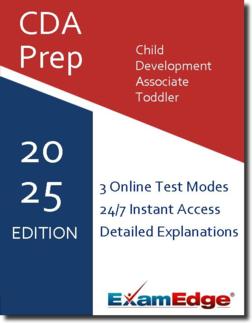Child Development Associate - Toddler (CDA-toddler) Practice Tests & Test Prep by Exam Edge - Test Reviews
Based on 17 Reviews
- Real Exam Simulation: Timed questions and matching content build comfort for your Child Development Associate Toddler test day.
- Instant, 24/7 Access: Web-based Child Development Associate Toddler practice exams with no software needed.
- Clear Explanations: Step-by-step answers and explanations for your CDA exam to strengthen understanding.
- Boosted Confidence: Reduces anxiety and improves test-taking skills to ace your Child Development Associate Toddler (CDA-toddler).

Child Development Associate - Toddler (CDA-toddler) Practice Tests & Test Prep by Exam Edge - Review
Child Development Associate Toddler - Reviews
Excellent
Based on
85
reviews
“ I really like the area; it was organized. Very quiet environment to take a test. And I would recommend it to anyone who wants to take a test. Thank you so much.
Faisa, minneapolis, Minnesota
“ The program helped me get ready for my CDA Exam. I liked that there were multiple tests to take and that you could reset each test and take it again. I feel like these practice tests helped me ultimately pass the exam.
Tracey , Bluemont, Virginia
See why our users from 154 countries love us for their exam prep! Including 17 reviews for the Child Development Associate Toddler exam.
Exam Edge is an Industry Leader in Online Test Prep. We work with our Institutional Partners to offer a wide array of practice tests that will help you prepare for your big exam. No Matter how niche field of interest might be, were here to help you prepare for your test day.
| 2.8M | 4.5M | |
| Users | Tests Taken | |
| 100K | 19 | |
| Unique Exams | Years in Business | |


